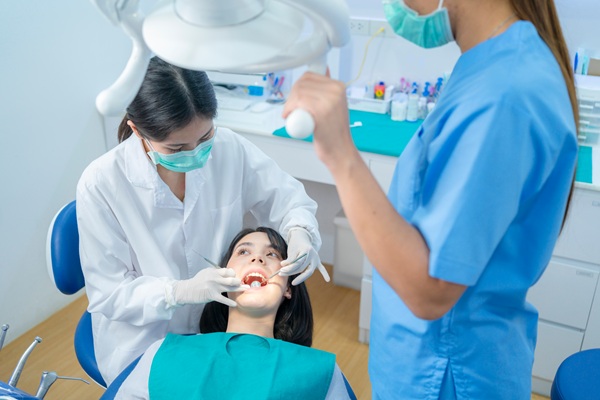Does TMJ Cause Jaw Pain?

TMJ disorder is a common issue that can result from teeth grinding and other dental concerns. Most instances are minor, but TMJ that is left untreated can linger or worsen into a more serious issue. Many instances of jaw pain are caused by TMJ, and it is helpful to understand the symptoms of TMJ and when it is encouraged to visit the dentist for treatment.
What to expect from TMJ symptoms
Everyone who endures TMJ disorder has a unique experience, but there are certain symptoms that are most common. The following is an overview of TMJ disorder, including what caused the condition, what the symptoms are and how a dentist can treat TMJ disorder long-term.
TMJ defined
Temporomandibular joint (TMJ) disorder refers to localized pain inside of the joint that connects the jaw and the skull. It is most commonly caused by teeth grinding or jaw misalignment, although there are other potential causes as well. In many instances, it is hard for dentists to diagnose the root cause of TMJ disorder. However, the symptoms of TMJ are very distinct, and it is easily recognizable when instances of TMJ disorder are present.
Symptoms of TMJ
Perhaps the most prevalent symptom of TMJ disorder is jaw pain. This is because the temporomandibular joint is located in the jaw and serves an essential role in the opening and closing of the mouth. When it is injured or overworked, then jaw pain can result. A more extensive list of symptoms of TMJ includes:
- Jaw pain
- Jaw tenderness
- Ear pain and ache
- Difficulty chewing
- Lockjaw
Minor jaw pain and tenderness may not require an immediate visit to the dentist, but more severe or chronic symptoms can become problematic and begin to affect your ability to function daily.
How to deal with TMJ jaw pain
It is important for patients who experience symptoms of TMJ disorder to consult with a dentist for prompt diagnosis and treatment. This ensures symptoms are dealt with in a timely manner before they worsen or linger for longer than what is necessary. If the symptoms are minor, then over-the-counter medication, icing and wearing a mouthguard to prevent teeth grinding may be all that is required to deal with TMJ jaw pain.
TMJ treatment options
TMJ varies in levels of severity. Some instances of TMJ can be treated through minor lifestyle changes, anti-inflammatory medication and icing the affected area. However, more severe instances of TMJ may require more extensive treatment and possibly surgery. A highly recommended alternative to lifestyle changes and over-the-counter medication for TMJ is Botox®, which is safe and non-invasive. If non-surgical treatments do not work, patients may consider a surgical procedure to deal with the concern.
Schedule a TMJ treatment consultation
Reach out to our friendly dental team today to learn more about TMJ symptoms and treatment options. We have experience treating patients who are dealing with the jaw pain caused by TMJ, and we make a strong effort to help each one of our patients to make a fast and full recovery.
Request an appointment here: https://www.yourhuntsvilledentist.com or call René A. Talbot, DDS at (256) 382-6690 for an appointment in our Huntsville office.
Check out what others are saying about our dental services on Yelp: TMJ in Huntsville, AL.
Recent Posts
Want to know what symptoms are associated with TMJ? Many symptoms are linked to this commonly diagnosed jaw-related disorder, including jaw pain. However, other symptoms are important to be aware of as they can help the general dentist make a diagnosis and treatment plan. Many are surprised to learn that a general dentist can diagnose and…
If you experience soreness or pain in the jaw, you may want to talk with your dentist about TMJ treatment and whether the condition is causing your pain or other issues. Temporomandibular joint dysfunction (TMJ) is a serious condition that causes stiffness in the joints of the jaw, pain, soreness, swelling, and loss of movement.…
TMJ disorder, or temporomandibular joint disorders, refers to a group of issues related to mobility and discomfort around the jaw joints. The temporomandibular joints are the joints that link the lower jawbone (mandible) to the skull. More than any other joint in the body, these flexible joints are constantly in use, performing actions such as…
As well as for cosmetic purposes, Botox® injections are used by many dentists as a treatment for temporomanibular joint pain. TMJ is a worsening disease of the lower jaw that causes a powerful clenching sensation and can lead to serious headaches. Dentists often recommend pain relief medications and bulky overnight headgear to deal with it.Because…


